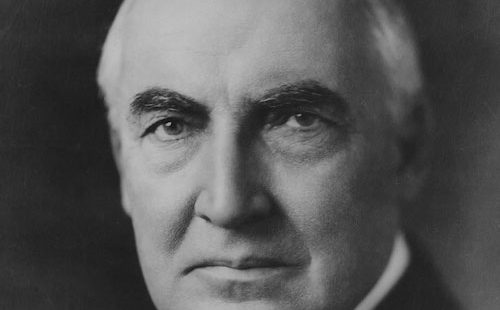Most of the time when we talk about someone creating a new word we speak of the inventor with admiration, or even awe. We think of the linguistic creations of long-dead writers, such as Shakespeare, as signs of their genius, or evidence that they singlehandedly chiseled a new life form out of granite and bequeathed it to the English-speaking people. We applaud these people who create language. That is, unless they happen to be politicians, in which case we laugh at them and say mean things. Warren Harding learned this the hard way.
In the presidential election of 1920 Harding made the ill-fated choice of using “A Return to Normalcy” as a campaign slogan. He was quickly and ruthlessly mocked, with mobs of ostensibly literate complainers howling that he had mistakenly used normalcy when he should have used normality. Many commenters assumed that this word did not exist, and a common misconception is that Harding invented normalcy. Warren Harding did not invent normalcy.
The word existed for over a half-century prior to his use of it (it dates to as early as 1857), although it was primarily used as a mathematical term. This has led some to critique that while Harding may not have invented it, but he was the first to use it improperly, and that’s just as bad. But Harding was also not the first person to use the word in a non-mathematical sense; it appears at least as far back as 1875, in the Chicago Sunday Times: “A little wine warms them into candor and normalcy.”
Harding won the election quite handily, notwithstanding the complaints about his word use. But his name has been forever associated with normalcy, and not in a good way.
In addition to Harding, many other political figures have been subjected to ridicule for exhibiting flexibility with their language, especially if their apparent invention seems to be the result, as Harding’s was, of simply making a mistake. Sarah Palin was not the first person to use refudiate; evidence of refudiation goes back to the late 19th century, and refudiate itself can be found in occasional use since 1925. Nor is Palin the first to use the term squirmishes. It appears several times in the 19th century, probably sometimes as misprintings. However once in a while it appears in quotation marks (as in this Atlantic Monthly article from 1889), which suggests that the writer assumed the audience would be unfamiliar with this term. A number of people used misunderestimate before George Bush famously said “They misunderestimated me,” but that hasn’t stopped us from mocking him for his slip of the tongue (or verbal inventiveness, depending on your political feelings).
Let’s call once again for a return to normalcy, but rather than normalcy standing for ill-conceived economic measures, it can perhaps be understood as the normal way that words are introduced to our language; sometimes through careful and thoughtful work, and sometimes just by someone making a mistake.













